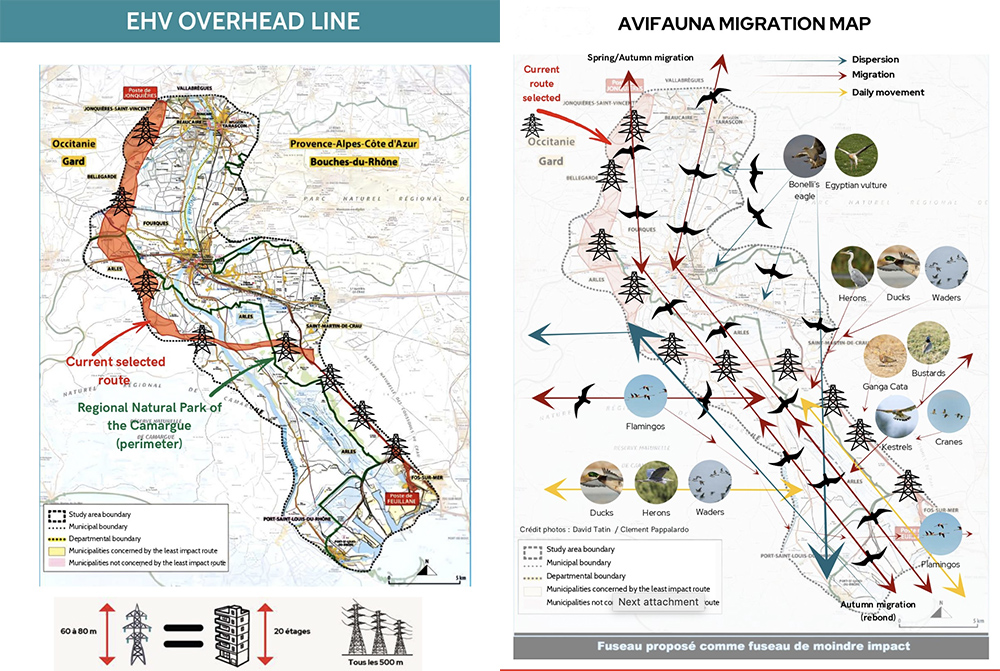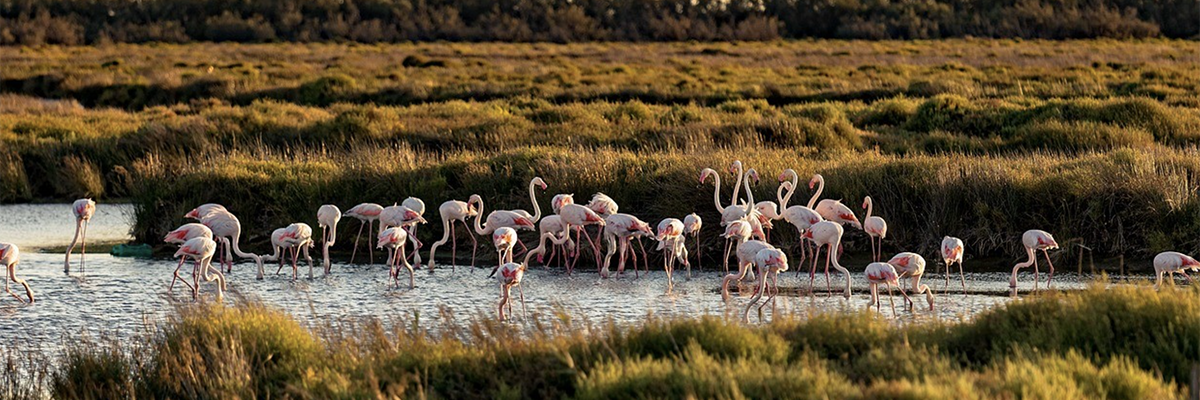The MEDSEA Foundation has officially joined 73 other international organizations in signing the Camargue Red Alert, a collective call to action to safeguard the Camargue wetlands in France. As a foundation committed to the conservation and restoration of marine and coastal ecosystems, including wetlands, this initiative reinforces our dedication to addressing the challenges posed by climate change and unsustainable infrastructure projects.
WHAT IS HAPPENING IN CAMARGUE?
The Camargue, a Natura 2000 site and UNESCO Biosphere Reserve, is under increasing threat from infrastructure developments, including the proposed construction of an Extra High Voltage (EHV) power line spanning 65 kilometers and crossing critical ecological areas. This project poses significant risks to biodiversity, including over 400 bird species, as well as the region's agricultural and cultural heritage.
The MAW - the Mediterranean Alliance of Wetland - in a press release, strongly advocates for alternative solutions that align with sustainable development goals, emphasizing the pivotal role wetlands play in climate adaptation, carbon sequestration, and flood regulation. Wetlands are not only vital for biodiversity but also for supporting the livelihoods of communities that depend on these ecosystems.
By signing the Camargue Red Alert, we join forces with environmental, research, and advocacy groups to call for the protection of the Camargue’s ecological integrity and a thorough evaluation of sustainable alternatives.

THE ECOLOGICAL STATUS OF CAMARGUE IS AT RISK
The Camargue, a unique wetland area in southern France, is facing significant environmental challenges due to increasing infrastructure projects. The most pressing concern is a proposed extra-high voltage (EHV) overhead power line that would span 65 km across this ecologically sensitive region. This project, consisting of 180 pylons, threatens to disrupt the delicate balance of the Camargue's ecosystem, which is home to exceptional biodiversity including 400 bird species, representing 75% of France's total bird species.
The proposed EHV line would cross and impact numerous protected areas, including four Natura 2000 sites, a UNESCO MAB Biosphere Reserve, a Ramsar site, the Coussouls de la Crau National Nature Reserve, and the Parc Naturel Régional de Camargue. The project poses a significant threat to wildlife, particularly birds, as it would intersect key migration routes and daily movement paths. The risk of fatal collisions is high, especially for vulnerable species such as birds of prey, flamingos, and waders. Additionally, the project would have a substantial impact on the iconic landscapes of the Camargue, potentially damaging its visual and cultural identity, which are crucial for the region's tourism industry.
This investment, estimated at 300 million euros and due to be commissioned in 2028, is designed to meet the growing electricity needs of the Provence-Alpes-Côte d'Azur region.This project is in line with the objective of achieving carbon neutrality by 2050.
‘’The signatories fully support decarbonisation, but refuse to see it at the expense of biodiversity. Nature is our ally in tackling climate change: wetlands are major carbon sinks. They also play a key role in dealing with extreme events by acting like sponges: they absorb irregular rainfall, reduce flooding and recharge groundwater during periods of prolonged drought’’.
See press kit.
Latest news

ARTEMIS: Marine Reforestation Activities Begin in Northern Sardinia
Marine reforestation efforts under the European Interreg Euro-MED “ARTEMIS” project have officially begun off the northern coast of Sardinia, in Santa Teresa Gallura.

REST-COAST: Strategies for the Protection of European Coasts Outlined in Catania
From March 24 to 27, 2025, the annual meeting of the European project REST-COAST, funded by the Horizon 2020 program, was held in Catania. The meeting marked a key milestone toward the…

A Forest for Bees Takes Root in Sardinia: Restoring Nature, Supporting Pollinators
The planting operations for the first Forest for Bees installation—a forest for bees—have been completed in Sennariolo (OR). This is a special one-hectare forest dedicated to bees and pollinators, essential insects for food…

Altare Hosts RICREA Meeting: Shared Strategies Through Ecological Transition Contracts
The third Steering Committee of the RICREA project – Collaborative Network for the Capitalization of REtrAlags – was held in Altare (Savona). The project is funded by the Italy–France Maritime Interreg Programme.

GRRinPORT2: Innovation and Cross-Border Cooperation for Environmental Protection of Ports
On March 20–21, 2025, the Kickoff Meeting of the GRRinPORT2 project – Management of water, waste, and sediments to reduce pollution in ports – was held at the DESTEC Department of the University of Pisa…

MEDSEA Launches the Wetland4Change Project in Terralba to test and validate climate change's solutions
On Friday, March 14, 2025, in the council chamber of Terralba, MEDSEA held a meeting with the Municipality of Terralba to officially introduce Wetland4Change to stakeholders (productive activities, as well as institutional…

In Crete with ARTEMIS to protect seagrass meadows: 2nd Consortium Meeting
From March 4th to 6th, 2025, Heraklion (Crete) hosted the mid-term meeting of the ARTEMIS Interreg Euro-MED Natural Heritage project, organized by the Hellenic Marine Research Centre. This was a crucial moment to…

MEDSEA Heads to Tallinn for the Blue4All Consortium Meeting
Last January, the Blue4All project team gathered in Tallinn for the Consortium Meeting, marking the project's halfway point. The event, hosted by the local partner Keskkonnaamet/Estonian Environmental Board and the University of Tartu, brought together all 22 project partners from across…

ImPelaghiamoci: A Year of Initiatives to Learn About and Protect Cetaceans with the Municipality of Sassari
Promoting greater knowledge of the resident cetaceans in the Pelagos Sanctuary*, a transboundary marine protected area encompassing France, Liguria, Tuscany, and Sardinia, to improve the protection and conservation of these species…

Reforestation Operations Resume in Montiferru: A Forest for Bees by MEDSEA
Reforestation efforts in Montiferru, led by MEDSEA, are back on track. Following the planting of the first 5 hectares of olive trees, holm oaks, and Mediterranean shrubs, the focus now shifts to melliferous plants to…

25 Events in Sardinia for World Wetlands Day
Wetlands such as ponds, lagoons, lakes, rivers, and peatlands form an endless world of aquatic ecosystems. In Sardinia, the call to explore these habitats is open this February with the Sardinian edition of World Wetlands Day.

COASTRUST: Launching Sustainable Coastal Management in Domus de Maria Sardinia
The activities of the COASTRUST project, funded by the European Interreg Euro-MED program, have officially begun in Sardinia. The initiative aims to promote shared environmental management in the Mediterranean's coastal areas, addressing anthropogenic pressures…

Join the World Wetlands Day Sardinia 2025 Calendar: register your Event by January, 22nd
World Wetlands Day is celebrated every year on February 2, marking the adoption of the Convention on Wetlands signed on February 2, 1971, in Ramsar, on the shores of the…

MEDSEA joins the Camargue Red Alert with the Mediterranean Alliance for Wetlands to save birdlife
The MEDSEA Foundation has officially joined 73 other international organizations in signing the Camargue Red Alert, a collective call to action to safeguard the Camargue wetlands in France.

Wetland4Change: MEDSEA in Valencia to Explore Natural Climate Solutions Through Wetlands
The MEDSEA team participated in the second Consortium meeting of the Wetland4Change project in Valencia from November 26 to 28, 2024. The meeting was organized by local project partners, the…

Malta’s First Posidonia Meadow Restoration Project Led by MEDSEA Foundation
Different islands, but similar issues for marine ecosystems, which are heavily threatened by unregulated anchoring from recreational boating and illegal trawling. In Malta, as in Sardinia, the damage is particularly…
- 1
- 2
- 3
- 4

